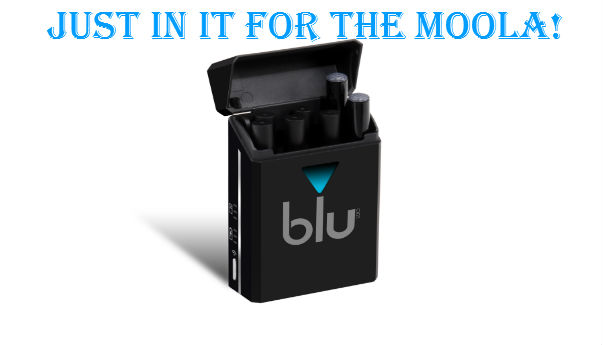Talk About Hypocrites: Just In It For The Moola

The manufacturer of the top-selling e-cigarette brand, Blu eCigs, is trying real hard to convince lawmakers to ban vaping. That might sound ass-backwards, but it isn’t. Blu is a product of big tobacco, which is hoping to stymie the competition by making sure its disposable “cigalikes” pass regulations but the refillable mods you find at your local vape shop don’t.
Reynolds, the biggest of the big tobacco firms, submitted a 119-document to the Food and Drug Administration arguing to ban “open system” vaporizers, the Winston-Salem Journal reported. Those are the DIY mods that come with tanks you fill yourself with the e-liquid of your choice.
The firm argues that there’s no way to safely regulate the liquid people are vaping or ban flavors that arguably appeal to kids. Disposable e-cigs, on the other hand, come pre-loaded so it’s easy for a company to control ingredients and limit flavors. That certainly true, but it’s not the whole story. Outright banning refillable vaporizers would effectively wipe out (or drive underground) out an entire booming industry of flavored juices and personalized mods in favor of big tobacco’s inferior products. (Seriously, those nic sticks are gross.)
“We believe open-system vapor products create unique public health risks. “These systems are highly subject to adulteration and tampering,” Reynolds rep told the Journal. The company owns Vuse, a fast-growing cigalike brand, and is in the process of acquiring Lorillard, the tobacco giant that owns Blu.
Of course, this was expected. As soon as the FDA proposed its e-cig regulations this spring it was clear that the rules favored the big brands and threatened to choke the competition. The process to gain FDA approval for a new product is time-consuming and expensive, and it’s safe to assume the tobacco corps expected the government to crack down on flavors the same as it does with regular combustible cigarettes.
The lengthy report from Reynolds was submitted during the FDA public comment period, which ended August 8. The other tobacco companies apparently weighed in too, but not as strictly as Reynolds, which has the biggest stake in e-cigs and the most incentive to nip the vaping craze in the bud.
Tobacco companies thought they were being clever by embracing the digital smokes that threatened to steal away a chunk of their nicotine-addicted customer base. But instead, the trend got away from them. Sales of the e-cigs you can pick up at a bodega counter have tanked as people gravitate toward the customizable mods and uniquely flavored e-juice sold by upstart merchants at vape shops. That’s exactly what big tobacco’s hoping its deep pockets and political influence can stop.
